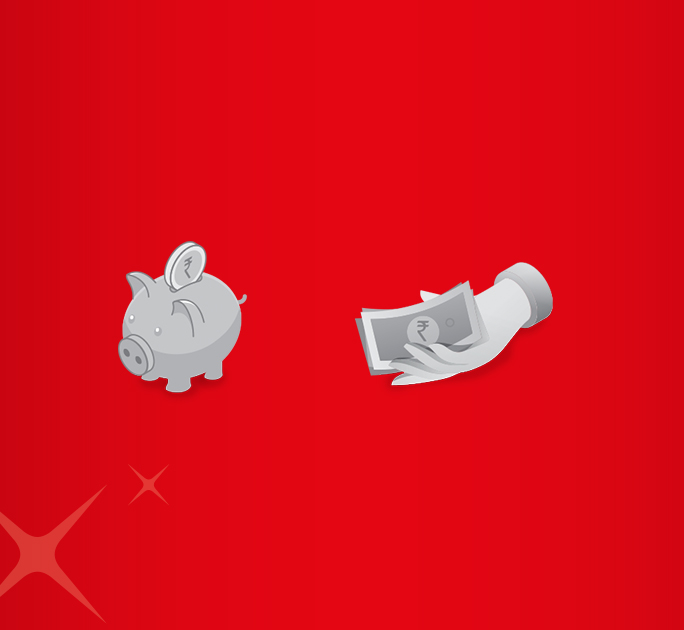- Save
- Invest
- Borrow
- Pay
- More
- Customer Services
What Is an Emergency Fund and Why It’s Important
Life can be unpredictable. Whether it’s an unexpected medical expense, unemployment or urgent home repairs, such situations can disrupt both your routine life and your finances. This is why it’s important to build a safety net.
In this article, we will understand what an emergency fund is and how it can save you from spiralling into debt.
How Much Should You Save for an Emergency Fund?
One of the first things that comes to mind is how much I need to save for an emergency fund. When you start planning for an emergency fund, it’s important to consider the following factors:
- Job stability
- Dependents (children or others)
- Overall health status
- Outstanding loans or debts
Generally, it is assumed that saving for three to six months of essential expenses is the sweet spot. However, if your income source is not stable, it is best to aim for nine or a year’s worth of essential expenses.
How to Start Building Your Emergency Fund
Getting started with your emergency fund doesn't need to be complex. Here’s how you can get started:
- Step 1: List out your monthly essentials: rent, groceries, utilities, EMIs, insurance.
- Step 2: Create a Budget. Set a goal to save a certain amount in a month that would go towards your emergency fund.
- Step 3: Set up automatic transfers from your savings account or salary account to a different account or fixed/ recurring deposit, so you are consistent with your plan.
- Step 4: Increase your emergency funds with extra Income or from tax refunds.
Best Places to Park Your Emergency Fund
Your emergency fund should be easy to access in times of need. It should also be stored in a way that allows it to earn modest interest without or with minimal exposure to market risks.
- High-interest savings accounts: Offer liquidity along with better returns than standard accounts, making them ideal for emergency reserves.
- Short-term fixed deposits: With slightly higher interest rates and short lock-in periods, fixed deposit offers a balance between growth and access.
- Recurring deposits: Useful for disciplined saving, especially if you're building your emergency fund gradually.
It’s best to avoid volatile instruments like stocks or mutual funds. In a crisis, market fluctuations could reduce your fund’s value just when you need it most.
Read More About: How to start investing in Mutual Funds
When Should You Use Your Emergency Fund?
An emergency fund is meant to be used during financial emergencies for situations that are unforeseen, unavoidable, and require immediate attention. Such situations can be.
- Medical emergencies (e.g., unplanned hospitalizations).
- Job or income disruptions (e.g., layoffs, salary delays).
- Essential home or vehicle repairs that can’t be deferred.
Planned expenses such as vacations, festive shopping, or big purchases should not be funded through your emergency savings.
How to Rebuild Your Emergency Fund After Use
If you have had to draw from your emergency fund, it is important to act quickly and thoughtfully to restore it.
Here’s how to proceed:
- Revisit your budget to resume saving.
- Cut back on any non-essential expenditures to speed up the growth of emergency funds.
- Reflect on whether the emergency could have been foreseen or avoided through better planning.
Also Read:- How Can a Savings Account Help in Fund Readiness
Emergency Fund Strategies by Life Stage
The need for an emergency fund and its requirements can vary across the life stages and financial responsibilities:
- Young professionals: Aim to save at least one month’s essential expenses.
- Families with dependents: Build a larger reserve to safeguard family well-being.
- Near-retirees and retirees: Maintain one to five years’ of living expenses.
Mistakes to Avoid While Managing Your Emergency Fund
To maintain the effectiveness of your emergency fund, steer clear of these common errors:
- Inadequate savings: Setting aside too little or delaying contributions can leave you vulnerable during emergencies.
- Neglecting replenishment: Failing to rebuild the fund after use reduces your financial preparedness for future crises.
Conclusion
Establishing an emergency fund is an important step toward financial security. Even modest contributions can evolve into a substantial buffer over time, offering both security and flexibility during unforeseen events. You can open a savings bank account online (with competitive interest rate) to start with building your emergency fund. You can also use fixed or recurring deposits to strengthen your financial foundation.







